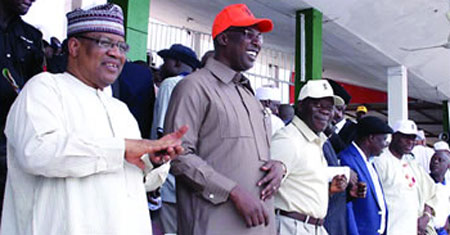Violent anti-government protests drove Tunisian President Zine El Abidine Ben Ali from power Friday after 23 years of iron-fisted rule, as anger over soaring unemployment and corruption spilled into the streets.
Thousands of demonstrators from all walks of life mobbed the capital of Tunis to demand Ben Ali’s ouster, the culmination of weeks of protests that have swept the country. Prime Minister Mohammed Ghannouchi went on state television to announce that he is assuming power in this North African nation known for its wide sandy beaches and ancient ruins.
The shakeup was certain to have repercussions in the Arab world and beyond — as a sign that even a leader as entrenched and powerful as Ben Ali could be brought down by massive public outrage.
The president tried vainly to hold onto power amid the riots, declaring a state of emergency Friday, dissolving the government and promising new legislative elections within six months. On Thursday night he went on television to promise not to run for re-election in 2014 and slashed prices on key foods such as sugar, bread and milk.
Yet Friday produced the largest demonstrations in generations. Police repeatedly clashed with protesters, some of whom climbed the walls of the dreaded Interior Ministry, site of torture reports for years. Clouds of tear gas and black smoke hung over the city’s whitewashed buildings and tour operators hurriedly evacuated thousands of tourists.
Tunisian air space was closed and unconfirmed news reports citing unidentified government sources said Ben Ali had left the country.
His whereabouts were not known and the details about his removal from power were unclear. The prime minister did not say anything about a coup or about the army being in charge, saying only that he was taking over while the president is “temporarily indisposed.”
“I take over the responsibilities temporarily of the leadership of the country at this difficult time to help restore security,” Ghannouchi said in a solemn statement. “I promise … to respect the constitution, to work on reforming economic and social issues with care and to consult with all sides.”
The state of emergency remained in effect after the prime minister’s announcement, and the streets of central Tunis fell mostly quiet after a day of rioting and volleys of tear gas. A black armored vehicle stood behind the Interior Ministry. Brief, isolated shots of gunfire could be heard into the night.
Earlier in the day, tour operator Thomas Cook said it was evacuating 3,800 British, Irish and German vacationers from Tunisia as a precaution. Tourism is one of the nation’s key industries.
The 74-year-old leader came to power in a bloodless coup in 1987. He took over from a man called formally President-for-Life — Habib Bourguiba, the founder of modern-day Tunisia who set the Muslim country on a pro-Western course after independence from France in 1956.
Ben Ali removed Bourguiba from office for “incompetence,” saying he had become too old, senile and sick to rule. Ben Ali promised then that his leadership would “open the horizons to a truly democratic and evolved political life.”
But after a brief period of reforms early on, Tunisia’s political evolution stopped.
U.S. diplomatic cables released by WikiLeaks have called Tunisia a “police state” and described the corruption there, saying Ben Ali had lost touch with his people. Social networks like Facebook helped spread the comments to the delight of ordinary Tunisians, who have complained about the same issues for years.
Under Ben Ali, most opposition parties were illegal. Amnesty International said authorities infiltrated human rights groups and harassed dissenters. Reporters Without Borders described Ben Ali as a “press predator” who controlled the media.
He consistently won elections with overwhelmingly questionable scores: In 2009, he was re-elected for a fifth five-year term with 89 percent of the vote. Beforehand, he had warned opponents they would face legal retaliation if they questioned the vote’s fairness.
Ghannouchi, 69, is a trained economist who has been a longtime close ally of Ben Ali. Prime minister since 1999, he is one of the best-known faces of Tunisia’s government. He also has served as the country’s minister for international cooperation and its minister of foreign investment.
The riots started after an educated but jobless 26-year-old committed suicide in mid-December when police confiscated the fruits and vegetables he was selling without a permit. His desperate act hit a nerve, sparked copycat suicides and focused generalized anger against the regime into a widespread, outright revolt.
At least 23 people have been killed in the riots, according to the government, but opposition members put the death toll at more than three times that.
Crowds on Friday sang the national anthem, fists in the air.
“We want to end this dictatorship,” said Wadia Amar, a university chemistry professor. “The Ben Ali clan should be brought to justice. They’ve taken everything.”
Hundreds of police with shields and riot gear blocked the avenue Friday in front of the Interior Ministry. Helmeted police kicked and clubbed unarmed protesters — one of whom cowered on the ground, covering his face.
An AP Television News reporter heard gunfire in the center of the Tunisian capital late Friday afternoon, in addition to the popping of tear gas pistols.
A few youths were spotted throwing stones, but most demonstrated calmly. Protesters were of all ages and from all walks of life, from students holding mid-street sit-ins to black-robed lawyers waving posters.
“A month ago, we didn’t believe this uprising was possible,” said Beya Mannai, a geology professor at the University of Tunis. “But the people rose up.”
A founder of the main legal opposition party said the dramatic developments do not amount to a coup d’etat.
“It’s an unannounced resignation,” Nejib Chebbi said by telephone. To declare a permanent absence of a head of state, such as in a coup, elections would have to be held within 60 days, he said. “So they declare a temporary vacating of power.”
The change of power in Tunisia is unprecedented in the modern Arab world.
In Sudan in 1985, a collapsing economy and other grievances sparked a popular uprising, although the government was eventually ousted by a military coup.
However, the closest parallel in the broader Middle East comes from Iran — which is not an Arab nation — where mass demonstrations helped topple the Shah and usher in the establishment of the Islamic Republic in 1979.
In Washington, National Security Council spokesman Mike Hammer said the U.S. government, an ally of Tunisia in the war against terror, was monitoring the developments.
“We condemn the ongoing violence against civilians in Tunisia, and call on the Tunisian authorities to fulfill the important commitments made by President Ben Ali in his speech yesterday to the Tunisian people, including respect for basic human rights and a process of much-needed political reform,” he said.
-AP












